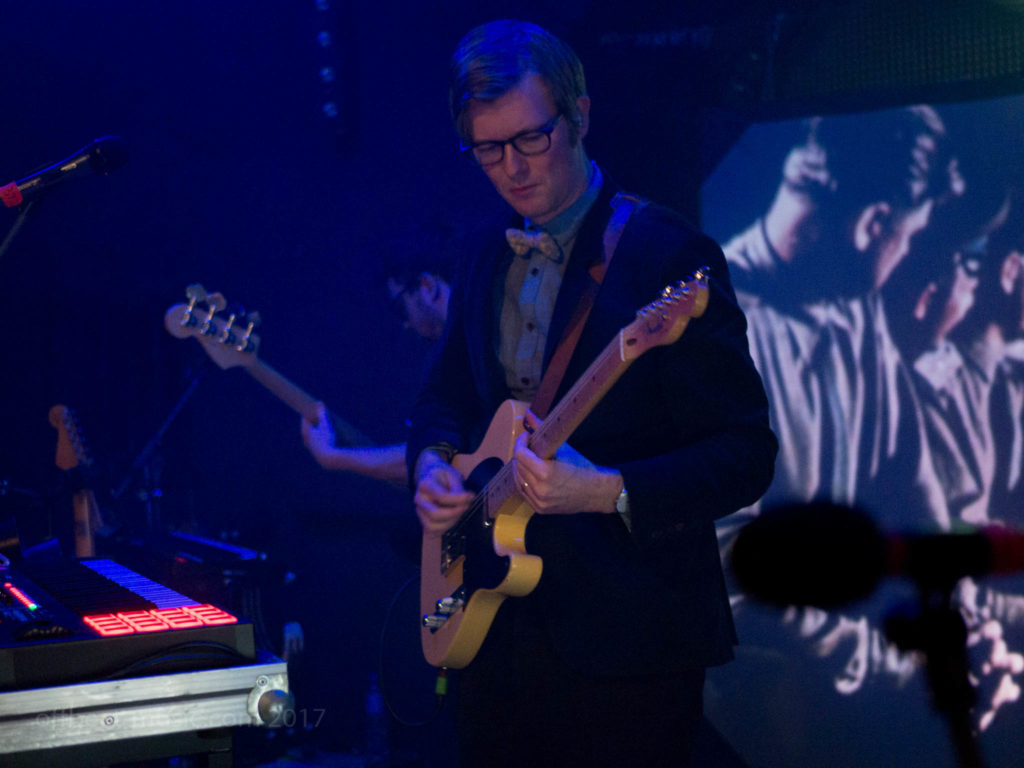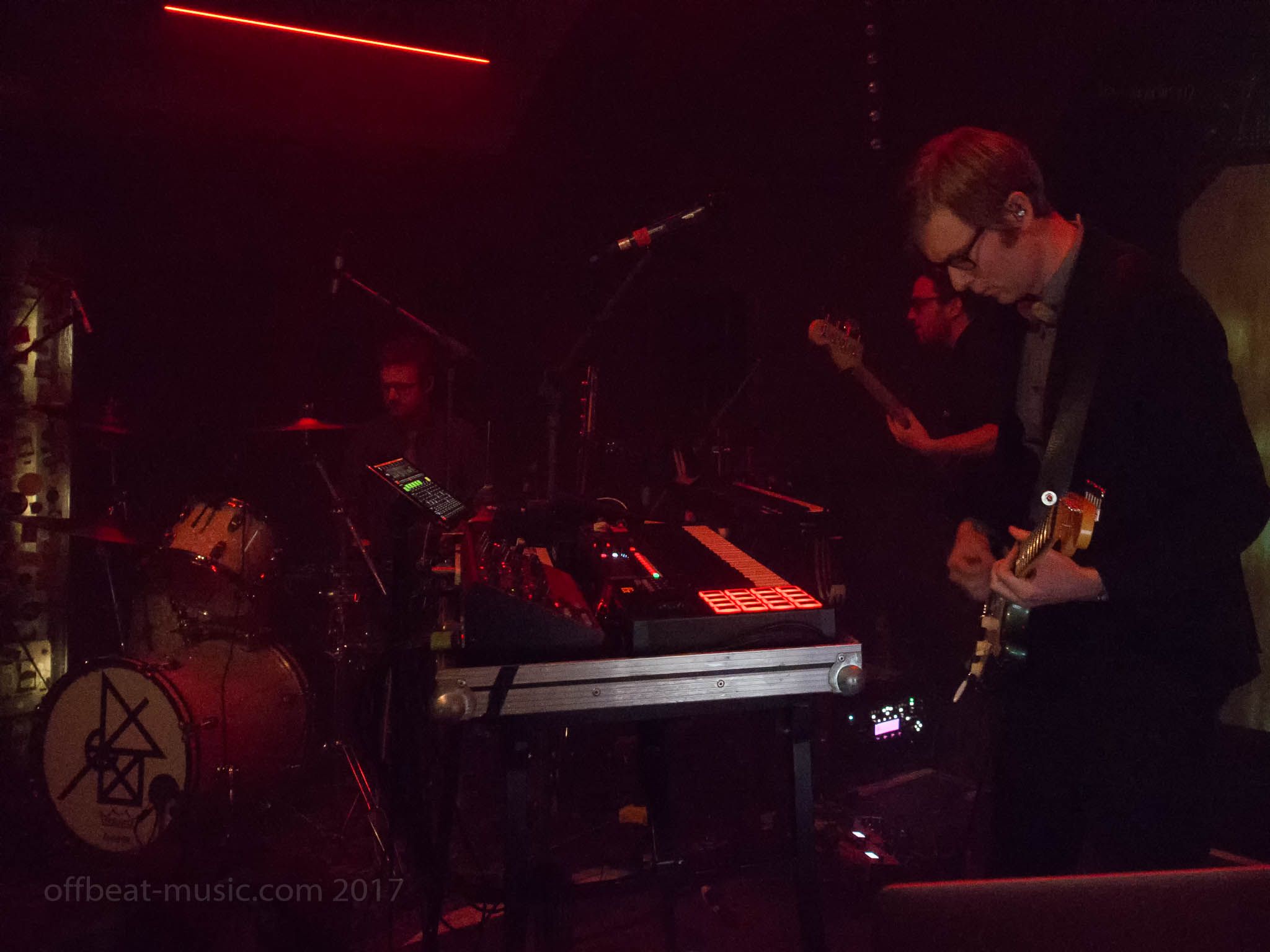After two albums and an EP (“Inform-Educate-Entertain”, “The Race For Space” and “The War Room”), all of which were setting audio footage (and visuals on stage) from public information films to driven synth music plus guitars, banjo and drums, resulting in a feast for the ears with an optimistic, sometimes of course ironic undertone, Public Service Broadcasting released “Every Valley” (PIAS). Now, I for my part, liked the other albums but their third oeuvre I love to bits. “Every Valley” is a change of direction in so many ways: It is not about a big global subject, not something from the past, not only celebratory, not with media commentary only – the album is about the demise of the coal mining industry in Wales, that and the still ongoing repercussions for the local communities, mostly told by members of the community of Ebbw Vale in South Wales themselves.
Now, some (albeit very few) regarded the work not as a step forward but claimed it was nostalgic and irrelevant (sic!) and even patronising. If you have listened to the album carefully (and I do recommend this so very much), you know these allegations could not be further from the truth. We are talking present here and relevance for many communities all over world and the fact that Public Service Broadcasting downsized on the footage and interviewed local people for quite a long time while staying in the village/town of Ebbw Vale, should do away with any of those comments for good. But as I said, those are very few and far between.
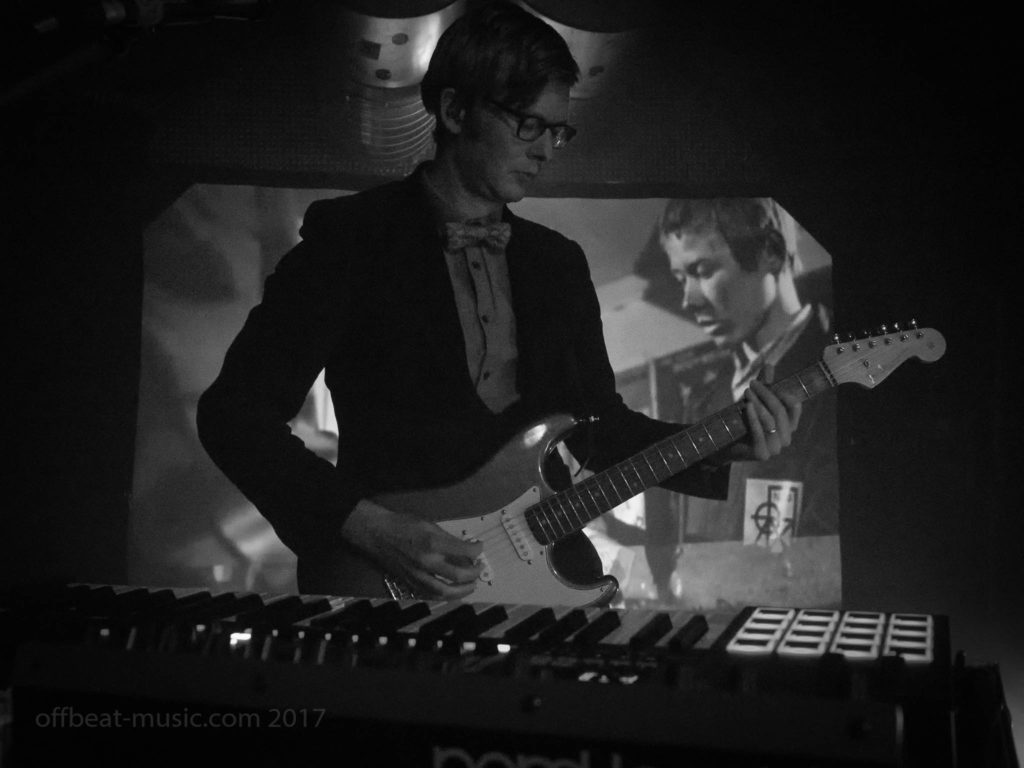
Read about “Every Valley” and more in J. Willgoose Esq.’s own words below. The Esquire, Wrigglesworth and J.F. Abraham descended on Cologne’s Yuca venue on November 26th to dish up a very fine show. I had not had the fortune to see them live so far, but my word, this was excellent as so many fans had already pointed out to me earlier this year.
There was dancing, there was big emotion, there was laughing, there was gentle swaying, there was shouting and clapping and whistling in the sold-out venue. And that was only the audience responding to a band, that despite it’s non-traditional band outfit delivered truly perfect entertainment. They rocked, they communicated, they overwhelmed with an audio-visual onslaught and magnificent drums, bass, flugelhorn and many beautiful roaring guitars and a banjo on top of a minutely timed synthesiser arrangement.
One not to be missed!
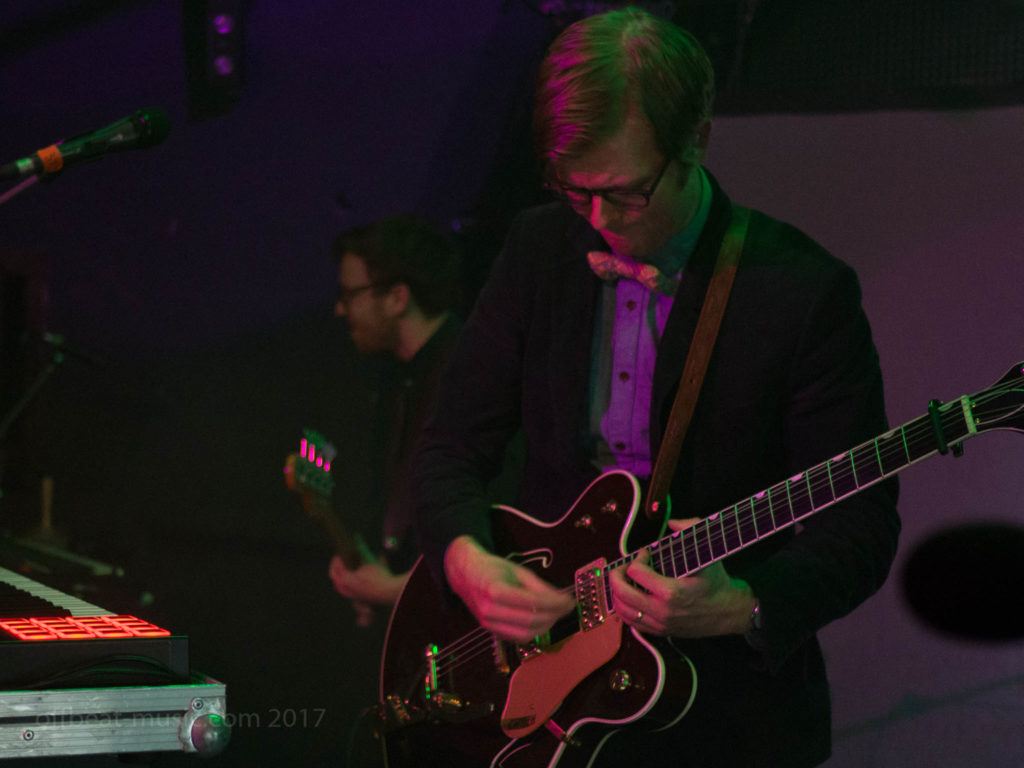
And here comes the interview with Public Service Broadcasting’s very own J. Willgoose Esq.!
Offbeat Music Blog: Thank you, J. Willgoose Esq., for taking the time before your gig here in Cologne with Public Service Broadcasting!
J. Willgoose Esq.: Of course!
OMB: Let’s start at the beginning. When you first started out to make music, did you plan it to be this very specific way, not in the traditional sense, or did that just fall into place along the way?
JWE: It very much fell into place. It was a very happy accident really. I was just making electronic music and didn’t really know what I was doing or why. Heard about some archive material on the internet and thought maybe I can use some of that just to kind of spruce up my music, I suppose. From there it just grew as a concept and an idea. I suddenly thought maybe I could do an album where each song was based on a different public information film. Despite thinking that sounded really, really pretentious, I carried on doing it and we’ve made three albums now, so there you go (laughs).
OMB: You tour a lot. For instance you also did SXSW festival. How is Public Service Broadcasting received among more traditional bands or among more traditional audiences in a rock environment?
JWE: I think it’s because there are a lot of different aspects to it – there is a lot of stuff going on even just with the music, let alone when you add the visuals to it, if we can – it seems to go down well across a very wide range of people which has been the case from the very start and it’s been very surprising from the very start but it has been consistent. I don’t know why. Maybe it is unusual, because it is conceptually strong or maybe because there are so many different genres and styles wrapped up in it, it is easy to find something that you like maybe. It is difficult to say. But we have never really had an absolute clanger of a show where it was just obvious that everybody hated us. I am sure people hate us in amongst every crowd but it never seemed to have lost an entire crowd if that makes sense. But I don’t know why that is. I think it is just luck.
OMB: I wouldn’t put it down to luck only. How do you manage to transport your albums onto stage?You love touring (mostly anyway, not the downsides of it) and when you have to transport your albums to a stage, it is not a matter of taking the drums, the bass and the guitar and off we go.
JWE: Hm, yeah, there is a lot of preproduction and planning and considering how to best play the songs and whose going to play which part and how you could it layer it and how could loop and what you are going to need to rely on coming off track, I suppose, just to make it as musically engaging as possible. So we all do a variety of things on stage. Even Wrigglesworth – he is not just drumming, he is playing a lot of electronics. He is playing a lot of tuned percussion parts. J.F. Abraham has got a whole lot of instruments and I have got a few myself, so, yeah: It is a lot of planning and work before we get on stage to try and make it as engaging as possible rather than just turning up either with instruments or just a laptop and pressing buttons because I find that quite boring. I guess, yeah, the boring answer is: Hard work ahead of time.
OMB: Do you stay very true to the albums on stage?
JWE: I think it sounds different. It is deliberately different. It often has a slightly harder edge. It is more kind of visceral first and foremost because it is louder and it is hitting you harder unless people listen to the music at 100 dB at home but I doubt it (laughs). So it packs more of a punch in that respect and you can show the visuals at the same time so you have a more emotional impact as well. Sometimes music makes more sense if you put it into live mode. I think we are on of those bands if you don’t understand it on the record, it is more likely to make sense live. It definitely changes live and we allow it to evolve and have some improvisational elements as well and not be same every night because that’s boring.
OMB: You probably have a stage setup particularly for one album and the records do definitely fall into the category concept albums. Can gig goers als expect older songs?
JWE: Yes, unless it is a specific event, we never play through an album in its entirety, partly because it is impractical a lot of the time. Partly because I don’t want to be sucked into being a mostly visuals band. I want it to be clear, it is a band playing songs from across our three albums and a bit. Just like any band really. You play two or three of this album, two or three of that album. There is obviously an emphasis on the new one because that’s what we are touring. So we are trying to play more of it. Yeah, I think the emphasis with the live show is that we are the common element, so we bind it all together. Even if there are jumps between narratives and eras and subjects and sometimes it doesn’t make sense but we are still the glue that’s holding it all together. That’s the idea behind it.
OMB: With the first two albums you were very close to the field your archive material, the often enthusiastic and glorifying material on big worldwide events (even though you probably used it in an ironical way). But with “Every Valley” you toned down to one region and one industry and to interviews with the people themselves. And yet “Every Valley”, I think, can be transferred to something globally as well. The subject seemed to downsize and yet it applies to a lot of places all over the world.
JWE: Yeah, that was the intention. I wanted to make an album about coal mining partly because of the availability of the material with the British Film Institute and partly because it seemed like an interesting change not to carry on in this optimistic, grand, large-scale sort of trajectory we had been on, to change things and try something new and a bit braver. And the more I researched, the more I started to think about setting it in one particularly area. For that reason, I think, in making it specific, centred in one region, it helps to let it travel. If you are able to use your imagination or use empathy and draw parallels between what’s happening in your country and what’s happening in Wales where we focussed on. It is a more political album in a quietish way. We are not making any grand, hectoring statements but we are allowing people to find their way through it a bit by telling the story of what happened in the words of the people who went through it for the absolute lion share of the album. That’s what we’ve done. Yeah, it’s weird, if you zoom in on something and make it so specific, actually, that helping to make it more universal. It seems paradoxical but I don’t think it is. But maybe I am wrong…
OMB: No, it certainly came across to me like that. It came at a time where there were elections all over the world (well the US one had already been and done). I found personally in the region where I live where there used to be mining in Germany, in the Netherlands and in Belgium, that there is no more working-class anymore nor is there the working-class spirit. Maybe because people do not feel represented by a political party anymore, maybe because they are not working class anymore but also because they have been caught by the most likely fake promises of the right-wing parties and this happened all over place. Did you encounter that phenomenon in Wales?
JWE: We spoke to a lot of people and we spent a lot of time there making the record. A lot of what you said rings true there certainly in terms of a neglected area, ignored by politicians in London for the most part. Once they (the politicians) had broken the union and wound the industry down…they did it in a very unsympathetic way without a real long-term vision for the area. The aim first and foremost was to break the power of unions, to break that kind of power of collectivism and then let the free market run riot basically. So it is not surprising that you find a slight breakdown in community and a slight breakdown in that sort of collective feeling or collective consciousness because you don’t have that collectivism that arises mostly from working in one industry together. One of the miners we spoke to said that one of the saddest and most profound changes was that young and old people in those villages and towns there don’t really speak to each other anymore because they don’t interact. Why would they? They used to finish a shift and you’d have young lads working their way up and the older hands and they’d all go to the pub together. You talk to people and it is such an easy way of bridging divides and understanding where different generations are coming from. If you lose the industry, you lose what’s at the heart of that community, the “mother of the village” as it were on the album, you lose that too. It is easy to see then how, especially with the political backdrop, these communities can become disenfranchised and disillusioned and more ready to be taken advantage of by sort of more populist ideologies like right wing or…I don’t even know if you’d call UKIP in the UK right wing, you might call them proto-fascist or something. It is very unsavoury and it is just further hurts those communities as well which is like the further ironic twist really.
OMB: Certainly having a working-class background myself and having grown up in such a region, I sometimes get told off by people for commenting, because they assume I am too far away from it now and not going through the same thing. How was that for you as a Londoner, an artist, coming to Ebbw Vale? Did you feel apprehensive?
JWE: Oh yeah, very. I am not only a Londoner. I grew up in relative middle-class comfort. I’ve never known that kind of physical toil and strife, neither that nor the feeling of growing up in those communities after the main industry has left. Very apprehensive and nervous that people might put up a wall and just refuse to talk or question the validity of the whole thing or say, what idea have you to be talking about this at all? I genuinely did not encounter that in Wales once. There wasn’t one person who took a slightly sniffy view. The choir we worked with, the miners we interviewed, the people from the National Union of Mineworkers, people in the community, people who were in Ebbw Vale who we worked with recording. The whole feeling was very much of encouragement and support and being pleased that a lens was being kind of trained on them. I think it helps that we weren’t coming in…obviously we structured the album and we made it flow in a certain way and decided which subjects we want to talk about but I don’t think we imposed our own narrative on it. We just filtered it through our creative filter of sorts. It is still their words and their story, just kind of interpreted through our music. I don’t know. I was worried about it and I expected us to get more flak than we’ve had. We have had some because it is inevitable but it didn’t deter me from wanting to do it. I’ve been reading recently about LCD Soundsystem coming back. James Murphy remembered from a conversation with Bowie that Bowie said: If it makes you uncomfortable, you should do it. That’s when you produce good stuff. I think it is definitely an element of making myself uncomfortable with this album to try and push on and do something different, do something more ambitious and challenge yourself really. Whether I succeed is only half the battle really, it is actually doing it in the first place. Being brave enough to take that risk is a big part of it.
OMB: Yeah, and not sitting at home or in a studio and sifting through the material but going out there and living there.
JWE: Yes, engaging in a more direct way. I think it is an interesting part of the evolution of the band from where it started which is much more sitting in a room at home in a much more clinical way. I think there is more emotion on this album. It is just a more interesting story told in a more interesting way. And it is interesting to see how the band has changed from its early days till now.
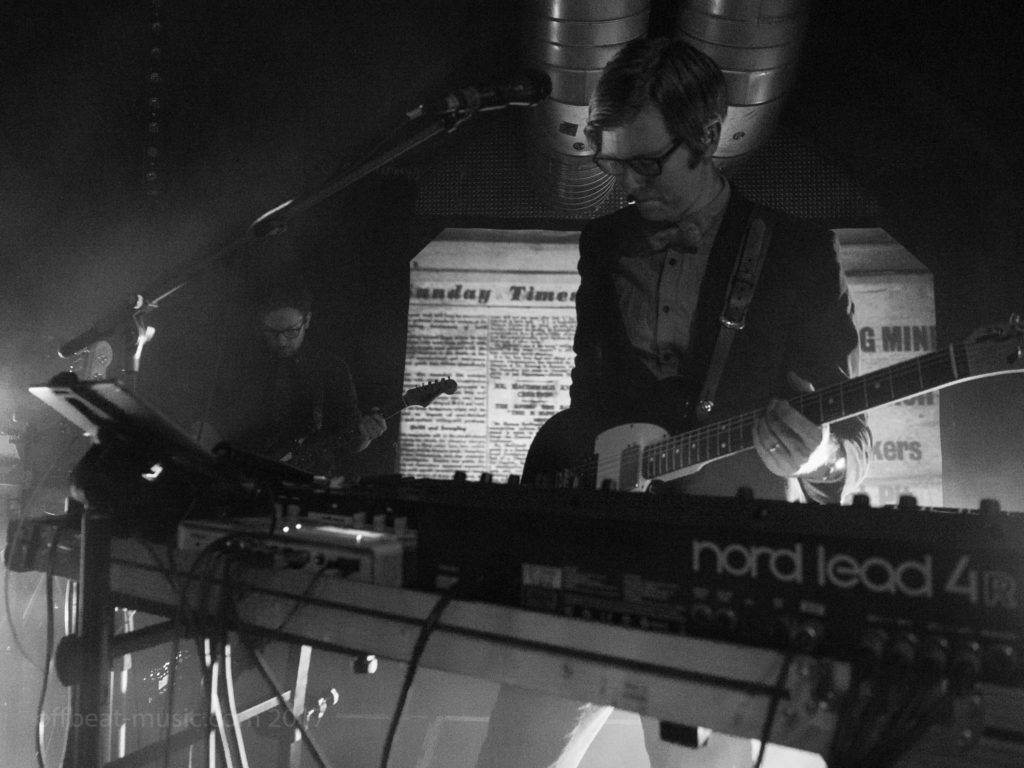
OMB: Besides Wrigglesworth, you have in J.F. Abraham a third member now as well?
JWE: Yeah, we just want to grow musically as well, represent the records as well as we can on stage while not going bankrupt in the process (laughs) which we haven’t always been that successful with. Hopefully going to a level where, you know…if you are lucky enough to have an audience and if you are lucky enough to have people who have been sticking with you for a while and trust you creatively, I think your obligation to them is to take creative risks and not to just see them as money in the bank kind of thing. “We need to put an album out every two years because we have got mortgages”. That’s not the point of it. If you are lucky enough to have established yourself and found an audience, you need to try and take them to new and interesting places. Maybe you lose some on the way but that’s part of the risk really.
OMB: Are you still in contact with the people in Ebbw Vale – I am probably pronouncing it so wrong…
JWE: If you say it more quickly, you are less likely to get it wrong (laughs). Yeah, when we played in Cardiff, we had the choir along. So they performed the last song and closed the night, so that was a very emotional moment. Hannah (Benkwitz) who did the artwork came along to that show so it was lovely to meet her. Ben Curtis who is a doctor at Cardiff University who was very helpful in the making came along with the people of the South Wales Miners Library. Trying to kind of make it so we didn’t just swoop in, take their story and then run off with it. Stay engaged and try and do some things to actually help the community, whether it is something as simple as going there to record it or going back there to launch the album which we did. Trying to bring some money to the area, some sort of artistic and economic activity that maybe they don’t see that often. That was really a rewarding side of it and a really satisfying part of it, regardless of the artistic or creative success/failure of the record: From a social point of view or a responsibility kind of view, it has been a good thing to do, unquestionably. That’s a good feeling to have.
OMB: You put Ebbw Vale back on the map?
JWE: I wouldn’t be as arrogant as to say that! We have given something back. We have done it with a sense of social responsibility. We did not use their story and ran off to the charts with it. We’ve tried to stay engaged and given some equipment to the local area and get young bands involved, had the local bands supporting us at the shows. Those kind of things that are just good things to do if you are of that kind of nature rather than being more individualistic.
OMB: More like an exchange then really?
JWE: They were so supportive and have allowed us to use their lives and their story and their community for our own purposes. That’s undeniable. But at the same time, it is a mutually beneficial arrangement hopefully and not an exploitative one.
OMB: Listening to the album, are the songs arranged in a particular order?
JWE: Definitely, and it is written that way too. So it is written start to finish in that order. I seem to find it works that way, I don’t know why.
OMB: Starting with Richard Burton’s quote about the proud miners?
JWE: Yeah, although that sample dropped in relatively late, getting the permission for that was late. Yeah, but starting with a more golden age. With a dissonance to it. There is this grandiosity but also this dissonance. As in something is not quite right. Almost lurking beneath the surface, I suppose. So it is not only about doom and gloom but casting back to when mining was a dangerous but valuable part of the community. And then the slow dive off the cliff really. But even then moment like “They gave me a lamp” shining some kind of positive light on telling a sad story.
OMB: If you think of the unbelievable working conditions those people worked in, the danger, the heat, the noise, the confined space, the air they breathed and what they contributed to their nation.
JWE: And then being thanked by just being left on the scrapheap. It’s disgusting really. It was one of the reasons for doing this album, was trying to get that message across how these people have been used up in that way. Again that idea of collective social responsibility which is not at the forefront of the album but it is lurking behind everything on it, hopefully. That we have to look after people in troubled times and less fortunate than those who are doing better. It is about society as whole rather than “there is no such thing as society” which is one of Thatcher’s most famous political announcements.
OMB: Wow, did she say that?
JWE: I think it was kind of taken slightly out of context but still…
OMB: I wouldn’t put it past her.
JWE: If you ask people to name things she said, it is that and “If you are over 30 years old and you are on a bus, you are a failure”. It is all about this individualistic view of life. What’s in it for me rather than for the greater good. It has been quite a poisonous mindset to have developed over the last thirty odd years back home.
OMB: It is really saddening. (Sensing, time is up). Right, so what can we expect tonight?
JWE: (Laughs). Well, you know, after all this heavy talk: It is a pop show. Lights and smoke and larking around. We will play about six or seven songs off the new album and intersperse it with older stuff. We change the setlist every night, so we don’t play the exact same set every night which is good, hopefully, for the fans and for us. We are gamely plugging away to play the music as best as possible. There’s live visuals as well running in the background in sync with the music.
It is hopefully an engaging and moving and occasionally mildly humorous show. It is different to a lot of stuff out there. It can be in the right setting quite overwhelming but in a good way. That’s the idea but whether or not we are able to get that across…
OMB: Well, I’ve been known to cry under my headphones listening to “Mother of The Village”…
JWE: Oh, blimey!
OMB: But I am just like that way.
JWE: If music gets you like that, music gets you like that! For two of us in the band it’s the same.
OMB: I think, it’s a good thing.
JWE: I think so too.
OMB: And on this note, thank you very much!
JWE: Thank you!
